Kenneth L. Gentry Jr.'s Blog, page 106
October 5, 2015
DISPENSATIONALISM, JERUSALEM, AND SACRIFICES
 PMT 2015-119 by Kenneth L. Gentry, Jr.
PMT 2015-119 by Kenneth L. Gentry, Jr.
As I continue catching up on correspondence, I am answering another question sent to me from a reader.
Reader question:
I have two questions on how you might respond to some Dispensational explanations of Ezekiel 40-48. (1) Some dispensationalists argue that the dimensions of Ezekiel’s temple are not a problem because the topography of the land will be radically changed in the millennium. They cite Zechariah 14 in defense of this topographical reconfiguration. They also cite the following passages to argue that Jerusalem will be much larger than what it is today: Jer. 31:38-40; Ezk. 48:30-35; Zech. 14;10-11. (2) The other thing relates to Ezekiel’s sacrificial system. They state that since the apostles did not have a problem with sacrifice in the New Testament, then why should we see it as problematic in the millennium? They cite Acts 21:17-26 in support of the idea that the apostles did not have a problem with sacrifice as a memorial and that Ezekiel’s sacrifices will have some efficacy for the unregenerate who are present in the millennium.
I have noticed that recently many Dispensationalists have felt the pressure of Covenant Theologians and have started an attempt to go on the offensive with their system via the internet and find ways to get around Covenant objections.
My response:
Thanks for your inquiry. Just briefly I would respond thus:
First, the prophetic texts that speak of Jerusalem being raised up are taken by dispensationalists in a woodenly literal fashion, as you know. But in fact, their interpretation is absurd. For instance, in Isa 2:2 we read:
“Now it will come about that in the last days, the mountain of the house of the Lord will be established as the chief of the mountains, and will be raised above the hills; and all the nations will stream to it. And many peoples will come and say, “Come, let us go up to the mountain of the Lord, to the house of the God of Jacob; that He may teach us concerning His ways, and that we may walk in His paths. For the law will go forth from Zion, and the word of the Lord from Jerusalem. Isaiah 2:3
Blessed Is He Who Reads: A Primer on the Book of Revelation
By Larry E. Ball
A basic survey of Revelation from the preterist perspective. It sees John as focusing on the destruction of Jerusalem and the temple in AD 70.
See more study materials at: www.KennethGentry.com
If this were taken literally (as dispensationalists do) note the absurdities involved:
For Jerusalem to be raised up as the highest mountain would involve such tectonic upheaval that it would absolutely destroy the city. Earthquakes are destructive natural phenomena. But this would involve even more catastrophe than quaking. It would engage mountain-building, which is absolutely destructive to a built city.
If it were indeed raised above the highest mountains, it would be uninhabitable. It would be higher than Mt. Everest. This would give it a horribly cold and snowy climate.
Not only would it be uninhabitable, but you wouldn’t see great masses of people heading up the mountain to learn the law of the Lord.
Obviously, this prophecy is speaking symbolically of the exaltation and dominance of God’s kingdom, not its physical elevation.
Second, the matter of temple worship. The problem with the dispensational argument based on Acts is: The old covenant and new covenant overlapped for about forty years. God did not shut down the old covenant immediately. He gave the Jews a generation to understand the changing of the redemptive economy. We should note:
In the Epistle to the Hebrews (written around AD 68-69), the writer speaks of the old covenant as nearing its final conclusion. Notice the verb tenses in this particularly important statement: “When He said, ‘A new covenant,’ He has made the first obsolete. But whatever is becoming obsolete and growing old is ready to disappear” (Heb 8:13). Consequently, in Acts the temple service was still in effect, but winding down. The temple began to be used as a base-of-operations for the Jewish converts to Christ to reach out to the Jews. But when AD 70 comes, the temple is forever removed.
The very idea of the sacrificial system was to point to its conclusion, when it was finally fulfilled and no longer necessary: “For the Law, since it has only a shadow of the good things to come and not the very form of things, can never by the same sacrifices year by year, which they offer continually, make perfect those who draw near” (Heb. 10:1).
Book of Revelation Made Easy
(by Ken Gentry)
Helpful introduction to Revelation presenting keys for interpreting. Also provides studies of basic issues in Revelation’s story-line.|
See more study materials at: www.KennethGentry.com
In fact, the text goes on to say: “But in those sacrifices there is a reminder of sins year by year. For it is impossible for the blood of bulls and goats to take away sins. Therefore, when He comes into the world, He says, Sacrifice and offering Thou hast not desired, but A BODY Thou hast prepared for Me; in whole burnt offerings and sacrifices for sin Thou hast taken no pleasure. Then I said, ‘Behold, I have come (In THE ROLL OF THE BOOK IT IS WRITTEN OF Me) to do Thy will, O God.’ After saying above, ‘Sacrifices and offerings and WHOLE BURNT OFFERINGS AND sacrifices for sin Thou hast not desired, nor hast Thou taken pleasure in them” (which are offered according to the Law), then He said, “Behold, I have come to do Thy will.” He takes away the first in order to establish the second. By this will we have been sanctified through the offering of the body of Jesus Christ once for all. And every priest stands daily ministering and offering time after time the same sacrifices, which can never take away sins; but He, having offered one sacrifice for sins for all time, sat down at the right hand of God, waiting from that time onward until His enemies be made a footstool for His feet. For by one offering He has perfected for all time those who are sanctified. And the Holy Spirit also bears witness to us” (Heb 10:3-15).
This is why Jesus taught the woman at the well: “Woman, believe Me, an hour is coming when neither in this mountain, nor in Jerusalem, shall you worship the Father” (John 4:21). The temple was on its way out. Mount Zion was about to lose its centrality and purpose.
To return to bloody sacrifices even as a “memorial,” would be to turn back to the blood of bulls and goats rather than turning to the blood of the Lamb of God. All bloody rites (including circumcision) have been done away with in Christ.
I hope this is helpful for your discussions with dispensational friends.








October 2, 2015
NEW COVENANT, OLD ISRAEL, AND THE CHURCH
 PMT 2015-118 by Kenneth L. Gentry, Jr.
PMT 2015-118 by Kenneth L. Gentry, Jr.
I am cleaning up my in box where I have piles of questions sent in by readers. These should be helpful not only for the individuals who asked them, but for anyone who is interested in studying biblical eschatology. So, here goes today’s question:
Reader’s question:
Dispensationalists point out that God promises the new covenant to Israel only. The Jeremiah 31 text clearly mentions only “the house of Israel and the house of Judah.” How can we say that the new covenant finds fulfillment in the Church?
My response:
Thanks for your question. I hope the following brief answer will be helpful. First, please note that Jesus and Paul both apply the new covenant to the Church.
The Lord’s Supper is the sacrament of the new covenant that Christians take on a regular basis. Christ established the Lord’s Supper with these words: “And in the same way He took the cup after they had eaten, saying, ‘This cup which is poured out for you is the new covenant in My blood'” (Luke 22:20). Paul repeats this in his epistle to the Corinthians: “In the same way He took the cup also, after supper, saying, ‘This cup is the new covenant in My blood; do this, as often as you drink it, in remembrance of Me'” (1 Cor. 11:25).
Israel in the Bible and History (9 mp3 lectures)
Conference lectures highlighting the nature, call and identity of Israel.
Important rebuttal to dispensationalism.
See more study materials at: www.KennethGentry.com
Paul is the “apostle to the Gentiles” (Rom 11:13; 1 Tim 2:7), yet he claims that he is a servant of the “new covenant” (2 Cor 3:6). Obviously he sees the new covenant as including the Gentiles.
Second, you will find by reading the New Testament that the Church of Jesus Christ is the fruition of Israel. In fact, many Jewish descriptors are applied to the Church. We are the “seed of Abraham” (Rom 4:13–17; Gal 3:6–9, 29), “the circumcision” (Rom 2:28–29; Php 3:3; Col 2:11), “a royal priest-hood,” (Rom 15:16; 1Pe 2:9; Rev 1:6; 5:10; cp. Ex 19:6), “twelve tribes” (Jas 1:1), “diaspora” (1Pe 1:1), the “temple of God” (1Cor 3:16–17; 6:19; 2Cor 1:16; Eph 2:21). These terms clearly reflect Israel’s covenantal identity, yet they are applied to the Gentile Church.
Peter designates Christians as “stones” building up a “spiritual house” (1Pe 2:5–9). But he does more: he draws upon several Old Testament designations of Israel and applies them to the church. He calls Christians: “a chosen generation, a royal priesthood, an holy nation” (1Pe 2:9–10; Ex 19:5–6; Dt 7:6). He and Paul call Christians “a peculiar people” (1Pe 2:10; Tit 2:14), which is a familiar Old Testament designation for Israel (Ex 19:5; Dt 14:2; 26:18; Ps 135:4).
Thus, New Testament Christians may even call Abraham “our father” (Ro 4:16) and the old covenant people our “fathers” (1Co 10:1), clearly evincing a spiritual genealogical relation. Employing another figure, Paul says we are grafted into Israel (Rom 11:16–19) so that we become one with her, partaking of her promises (Eph 2:11–20). Jesus teaches that Gentiles are other sheep which must be brought in to make “one flock” (Jn 10:16).
Paul even applies the name “Israel” to Christians: “And as many as walk according to this rule, peace and mercy be upon them, and upon the Israel of God” (Gal 6:16). The “and [kai]” preceding “Israel of God,” is probably epexegetical, so that we should translate the passage: “mercy upon them, that is, upon the Israel of God.” Unfortunately, Dispensationalists see Galatians 6:16 applying to Jewish converts to Christ, “who would not oppose the apostle’s glorious message of salvation” (New Scofield Reference Bible). But such is surely not the case. After all, Galatians’ entire context opposes any claim to a special Jewish status or distinction: “For you are all sons of God through faith in Christ Jesus. For as many of you as were baptized into Christ have put on Christ. There is neither Jew nor Greek, there is neither slave nor free, there is neither male nor female; for you are all one in Christ Jesus” (Gal 3:26–28). In the new covenant Christ does away with all racial distinctions. Why would Paul hold out a special word for Jewish Christians (“the Israel of God”), when he states immediately beforehand that we must not boast at all, save in the cross of Christ (Gal 6:14)? After all, “in Christ Jesus neither circumcision nor uncircumcision avails anything, but a new creation” (Gal 6:15).
Consequently, Jeremiah’s mentioning the house of Israel and the house of Judah poses no difficulties for the New Testament writers. They apply Jewish terms to the Christian faith because it is the fulfillment of Israel.
Third, the dispensational system presents an unnecessary confusion here. Consider: By Christ’s appointment, the Lord’s Supper is the sign of the new covenant (Mt 26:28; Mk 14:24; Lk 22:20; 1Co 11:25). It is to be kept until he comes (1Co 11:25–26). But in dispensationalism, when Christ comes to establish the new covenant with Israel for a millennium, he will do away with the Lord’s Supper (which is the sign of the new covenant), while re-establishing the bloody sacrificial system (which is an old covenant foreshadowing of Christ’s redemptive labor, Heb 10:1–3) as a “memorial.” And the millennial priests will perform this memorial in Christ’s bodily presence for 1000 years.
Tongues-Speaking: Meaning, Purpose, and Cessation
(Book) by Ken Gentry
A careful study of the biblical material defining the gift of tongues.
Shows they were known languages that served to endorse the apostolic witness
and point to the coming destruction of Jerusalem, after which they ceased.
See more study materials at: www.KennethGentry.com
The new covenant is one of the key stumbling blocks for dispensationalism. As important as the new covenant is in Scripture, dispensational theologians have not been able to settle on a particular view of it. Charles Ryrie’s Basis of the Premillennial Faith outlines three leading dispensational views: (1) The Jews Only View. This is “the view that the new covenant directly concerns Israel and has no relationship to the Church” (p. 107). (2) The One Covenant/Two Aspects View: The one “new covenant has two aspects, one which applies to Israel, and one which applies to the church” (p. 107). (3) The Two New Covenants View. This is Ryrie’s view, for this actually “distinguishes the new covenant with Israel from the new covenant with the church. This view finds two new covenants in which the promises to Israel and the promises to the Church are more sharply distinguished even though both new covenants are based on the one sacrifice of Christ” (p. 107).
Oddly enough, today dispensationalists no longer hold to three views of the new covenant. They now have four views: “there are four major dispensational views of the new covenant” (Dictionary of Premillennial Theology, 280). The new covenant creates pandemonium in the dispensational system.









September 30, 2015
COMPUTERS, THE BEAST, AND 666
 PMT 2015-117 by Kenneth L. Gentry, Jr.
PMT 2015-117 by Kenneth L. Gentry, Jr.
Once again I am offering some succinct answers to a reader’s question. Sometimes brevity can more quickly assist our understanding. (But please do not tell the publisher of my upcoming 1700 page commentary on Revelation.) Here is today’s question and brief answer.
Reader’s question
What is the “Mark of the Beast”? And since your answer will obviously have to have some first century application, isn’t it at all curious to you that for the first time in human history — with microchips, retinal scanners, a growing one-world economy, etc.—that the technology exists to make the “Mark of the Beast” a reality?
My response:
Thanks for your question. This type of thinking is fairly common in our American dispensationalist-dominated religious environment. However, I believe it is quite erroneous. The computer technology of today does not fit the requirements of the text of Revelation for the several reasons.
Beast of Revelation: Identified (DVD by Ken Gentry)
A biblical and historical argument for Nero being the beast of Revelation. Professionally recorded and edited with Question and Answers session.
See more study materials at: www.KennethGentry.com
But first, let’s look at Rev 13:18: “Here is wisdom. Let him who has understanding calculate the number of the beast, for the number is that of a man; and his number is six hundred and sixty-six.” Does this require computer technology? I do not believe so.
We must read this statement in its own literary setting. The mark of the Beast is no more a literal mark than the mark of the Lamb in the next few verse. In Rev 14:1 we read: “Then I looked, and behold, the Lamb was standing on Mount Zion, and with Him one hundred and forty-four thousand, having His name and the name of His Father written on their foreheads.”
I have never heard anyone teaching that the followers of the Lamb during the (supposed future) great tribulation will have a computer chip on their foreheads which holds the name of the Lamb in it.
In fact, this mark is actually an image of dominion and control. Notice that in Rev 13 no one may buy or sell without the mark (13:17). And note also that it is placed on the right hand and the forehead, which appear to represent that which we do (the right hand) and that which we think (the forehead). This speaks of oppressive, domineering control — which does not require computer chips to effect. There have been many totalitarian governments in the world.
In fact, today ISIS is a current example of such an attempt to control a person’s thinking and actions. And they do not need computer chips to do so.
The idea involved here is of a “beast” who imposes this mark due to his divine pretensions. He attempts for force men to worship him (Rev 13:4, 8). This may easily apply to emperor worship, which was well known in the historical setting of the seven churches of Asia (Rev 1:4, 11). And given a number of other interpretive angles this divine pretender would seem to be Nero Caesar, an egomaniac who actually did seek worship from men.
“Postmillennialism and Preterism“
Sacramento Eschatology Conference. Lectures (4 mp3s).
(1) Postmillennialism: Wishful Thinking or Certain Hope?
(2) The Identity of the Beast of Revelation.
(3) The Resurrection of the Dead.
(4) The Great Tribulation is Past.
See more study materials at: www.KennethGentry.com
The Book of Revelation is an extremely OT-oriented book. Thus, we always do well to check the OT background to see if we can find help. It appears that this mark on the right hand and forehead is a negative reflection on God’s requiring his Law on his people (Dt 6:8). God rightly imposes his Law on man; the “beast” (Nero Caesar?) wickedly seeks to impose his will, as if he is a god.
Any present day mark goes against John’s time-frame (near, Rev 1:1, 3; 22:6, 10), relevance (persecuted churches, Rev 1:9), and theme (judgment of Israel, Rev 1:7; 11:1–2, 8). The computer chip idea may excite the minds of devotees of science fiction, but it should not sway devotees of God’s historical word.
Thanks for your question. I hope this helps.









September 28, 2015
LITERALISM AND POSTMILLENNIALISM
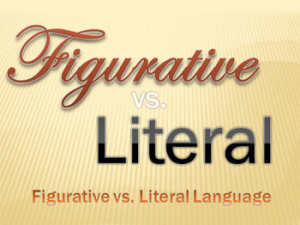 PMT 2015-116 by Kenneth L. Gentry, Jr.
PMT 2015-116 by Kenneth L. Gentry, Jr.
From time-to-time, I am able to answer questions that readers send in. Here is one that I have received in a few different forms. I thought PMT readers might appreciate this brief Question and Answer.
Reader question:
I have a question for you. I recently heard a postmill/amill debate. The amill gave a criticism against postmill that I am really stuck on. Maybe you can help.
He said that postmills apply the restoration Psalms and prophecies like dispensationalists do, in a literalistic, types and shadows fashion. For example, regarding Psalm 2:8 the amill said that postmills apply the terms “nations” and “earth” in a way that Jesus and the apostles never intended (political entities, etc.). From his perspective, the NT teaches that for Christ to make the nations and earth His footstool refers to the salvation of the Gentiles from every tribe tongue and nation, not Christ’s influence on political structures, etc.
I think this is a good argument and I am a bit stumped. Can you help me?
J.B.
My reply:
Thanks for your question. I don’t see where the problem is in this critique of postmillennialism. I would note the following:
We must be careful not to throw out all literalism just because dispensationalists wrongly use it. Clearly many prophecies are to be interpreted literally. Perhaps the virgin birth is the best example of a literal prophecy — in that it involves one of the fundamentals of the faith by impacting the pre-existence and deity of Christ.
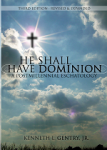
He Shall Have Dominion
(paperback by Kenneth Gentry)
A classic, thorough explanation and defense of postmillennialism (600+ pages). Complete with several chapters answering specific objections.
See more study materials at: www.KennethGentry.com
The Scriptures are not one-dimensional. They employ a variety of communicative forms and cover a broad range of literary types. We must check each text according to its context and its intended meaning.
Of course, the particular matter you bring up, does involve a particular text and context. You specifically mention Psalm 2:8. So here we have a concrete example, which is much better than an abstract principle.
I don’t see the problem with using Psa 2:8 as evidence for postmillennialism. That is, I don’t understand what the issue of “political entities”/ “political structures” has to do with the amill/postmill debate here. Even setting aside the idea that particular political entities are in view here, the fact remains that the Psalm declares that Christ will make “the nations” (whatever they are) and “the very ends of the earth” his possession. He is not speaking merely of converts selected out from the nations, but the nations and the very ends of the earth themselves. The psalm appears to be speaking of some sort of global dominance. And of course this is expected in postmillennialism.
In addition, I would note that David calls upon the kings and judges of the earth to do homage to the Son (Psa 2:10-12). It seems he goes to great lengths to speak of not only people in general (nations and ends of the earth) but even their political rulers and judges. This leads me to believe that he does have nations as such in view. We surely do not believe that God has no interest in political structures and kingdoms.

Navigating the Book of Revelation (by Ken Gentry)
Technical studies on key issues in Revelation, including the seven-sealed scroll, the cast out temple, Jewish persecution of Christianity, the Babylonian Harlot, and more.
See more study materials at: www.KennethGentry.com
Besides all of this, reducing the significance of Psa 2 would not affect the broader argument for postmillennialism. Postmillennialism is not a “one text” eschatological system (as premillennialism tends to be with Rev 20). We have a great number of texts from Genesis through Revelation that promote an optimistic view of the unfolding of history.
For instance, my book He Shall Have Dominion: A Postmillennial Eschatology presents, defends, and promotes postmillennialism. It is over 600 pages long and covers texts from both testaments. Indeed, it employs scores of biblical texts. It would be greatly reduced in size if it were only dealing with verses that speak of national entities.









September 25, 2015
MAJOR MINISTRY OPPORTUNITY FOR AMERICAN VISION
PMT 2015-115
This is a republication of a recent American Vision newsletter notice. It speaks to the concerns of postmillennialists. It is written by Joel McDurmon. Here it is:
For some time, we at American Vision have considered expanding our ministry to a more international scope. Over time, we will certainly do this in a more official capacity, but sometimes God makes your plans for you. Sometimes He just places things in your path and makes you deal with them before you thought you were ready.
We already have readers and partners all over the world: many parts of Europe and the UK, several countries in Central and South America, Canada, Mexico, Indonesia, China, Japan, Australia, New Zealand, a few countries in Africa, and more. But this has always been informal. It’s also been just a little awkward as well in that we spend a tremendous amount of time dealing with distinctly American history, policy, politics, and current events. However, our foci on theology, law, government, ethics, liberty, culture, eschatology, and apologetics are all part of God’s message for the world, and we want to take these worldwide in a more formal way.
A major opportunity has opened for us in taking the ministry of American Vision international. We’ve been considering this and praying about it for some time. God has answered. Many Christians are unaware that a massive revival has occurred (and continues) across large parts of India. Millions of souls have come to Christ for the first time. Home churches have arisen everywhere along with small Christian schools and orphanages.
With millions of new Christians, however, there is a tremendous need for leadership and leadership training. This means there needs to be worldview training as well. These millions of new believers in most cases know only the basics of the faith. There simply has not been either time or ministry personnel to teach them. There is a great opportunity to teach Christian worldview, and that is obviously where American Vision comes in.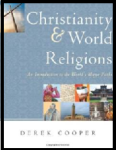
Christianity and the World Religions: An Introduction to the World’s Major Faiths
By Derek CooperCooper. Examines the rival worldviews found in Hinduism, Buddhism, Confucianism and Taoism, Judaism, Islam, and irreligion. He engages these worldviews from a Christian perspective.
See more study materials: www.KennethGentry.com
To this end, I accepted an invitation to speak at a local church in India—but I had no idea what God was about to do next. I found out that a missionary I know is in the same area as the invitation I accepted. When he heard I could come, he suggested we organize a pastor’s conference. Here, I will be able to help train over 100 indigenous pastors with a biblical worldview message.
Not only will we be reaching numbers of believers with our full-orbed, life-changing Gospel, we will be training a large group of the leaders to preach that message for decades to come.
But God was not done. We have also been connected with a Bible School in the least-evangelized state of India—way up near the Himalaya Mountains. We will be able to provide the same ministry here as at the pastor’s conference: training the Christian leadership of the next generation.
I cannot tell you how excited I am about this opportunity. God has opened a door for us in the midst of a nation-wide revival in the second largest population in the world. We will be on the ground-level of worldview development for Indian Christians. We will help shape leadership with a comprehensive biblical worldview in a culture historically filled with paganism and poverty.
Finding a Vision
(by Michael Milton)
Presents a biblical vision of church ministry and involvement.
See more study materials at: www.KennethGentry.com
As we engage this amazing opportunity, we ask that you would continue to help us with your prayers and financial support. God has certainly opened this path for us, but the way forward still requires hard work and sacrifice on our part. We need your help with this.
And this is just one of the international opportunities God has opened for American Vision recently. I’ll be able to share more with you in the days and weeks to come.
For more information see: www.AmericanVision.








September 23, 2015
MUSLIM REFUGEES CONVERTING IN DROVES
 PMT 2015-114 by Kirsten Grieshaber
PMT 2015-114 by Kirsten Grieshaber
BERLIN (AP) — Mohammed Ali Zonoobi bends his head as the priest pours holy water over his black hair. “Will you break away from Satan and his evil deeds?” pastor Gottfried Martens asks the Iranian refugee. “Will you break away from Islam?”
“Yes,” Zonoobi fervently replies. Spreading his hands in blessing, Martens then baptizes the man “in the name of the Father, the Son and the Holy Ghost.”
Mohammed is now Martin — no longer Muslim, but Christian.
Zonoobi, a carpenter from the Iranian city of Shiraz, arrived in Germany with his wife and two children five months ago. He is one of hundreds of mostly Iranian and Afghan asylum seekers who have converted to Christianity at the evangelical Trinity Church in a leafy Berlin neighborhood.
Like Zonoobi, most say true belief prompted their embrace of Christianity. But there’s no overlooking the fact that the decision will also greatly boost their chances of winning asylum by allowing them to claim they would face persecution if sent home.
Martens recognizes that some convert in order to improve their chances of staying in Germany — but for the pastor motivation is unimportant. Many, he said, are so taken by the Christian message that it changes their lives. And he estimates that only about 10 percent of converts do not return to church after christening.
Christianity and the World Religions:
By Derek CooperCooper. Examines the rival worldviews found in Hinduism, Buddhism, Confucianism and Taoism, Judaism, Islam, and irreligion. He engages these worldviews from a Christian perspective.
See more study materials: www.KennethGentry.com
“I know there are — again and again — people coming here because they have some kind of hope regarding their asylum,” Martens said. “I am inviting them to join us because I know that whoever comes here will not be left unchanged.”
Being Christian alone does not help an applicant, and Chancellor Angela Merkel went out of her way this week to reiterate that Islam “belongs in Germany.” But in Afghanistan and Iran, for example, conversion to Christianity by a Muslim could be punished by death or imprisonment, and it is therefore unlikely that Germany would deport converted Iranian and Afghan refugees back home.
None will openly admit to converting in order to help their asylum chances. To do so could result in rejection of their asylum bid and deportation as Christian converts. Several candidates for baptism at Martens’ church would not give their names out of fear of repercussions for their families back home.
Most said their decision was based on belief, but one young Iranian woman said she was convinced most people had joined the church only to improve their chances for asylum.
Congregation member Vesam Heydari initially applied for asylum in Norway and converted there in 2009. But his case was rejected because the Norwegian authorities did not believe he would be persecuted as a Christian in Iran, so he moved to Germany to seek refugee status here — and is awaiting a decision. He criticized many of the other Iranian church members, saying they were making it much harder for “real, persecuted Christians” like himself to get approved for asylum.
The majority of Iranians here are not converting out of belief,” Heydari said. “They only want to stay in Germany.”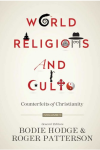
World Religions and Cults (Bodie Hodge, ed.)
This work is helpful for understanding and combating false religions and cults. It deals with the leading false religious beliefs in the world today.
See more study materials at: www.KennethGentry.com
Meanwhile, as other churches across Germany struggle with dwindling numbers of believers, Martens has seen his congregation swell from 150 just two years to more than 600 parishioners now — with a seemingly unending flow of new refugees finding the way to his congregation. Some come from cities as far away as Rostock on the Baltic Sea, having found out by word-of-mouth that Martens not only baptizes Muslims after a three-month “crash course” in Christianity, but also helps them with asylum pleas.
To finish reading click: HERE
http://www.kennethgentry.com/categories/Writing-Course/








September 21, 2015
DISPENSATIONALISM, ISRAEL AND THE CHURCH
 PMT 2015-113 by Kenneth L. Gentry, Jr.
PMT 2015-113 by Kenneth L. Gentry, Jr.
Classic dispensationalism has virtually disappeared among academics. Replacing it today is “progressive dispensationalism.” But though the head has died, the body yet liveth. In the lives of untold millions of unthinking Christians. Therefore, it is important to rebut the system in order to make the case for postmillennialism. This is another installment in my critique of dispensational errors.
House and Ice (Dominion Theology, 29, cp. 166) are correct to point out that “Reconstructionists appropriate for the church (seen as the new Israel) the material blessings for obedience–and curses for disobedience–originally promised by God to defunct national Israel.” How they could possibly set this forth as a “Reconstructionist” distinctive is beyond us, however. The dispensational view is the one with the distinctive element!
Dispensationalist John Feinberg writes: “It is clear that holding a distinctive future for ethnic Israel is essential to Dispensationalism” (Feinberg, Continuity and Discontinuity, 81). Ryrie states that “this is probably the most basic theological test of whether or not a man is a dispensationalist, and it is undoubtedly the most practical and conclusive” (Ryrie, Dispensationalism Today, 45). Indeed, this has been a dispensational distinctive since dispensationalism first arose 185 years ago!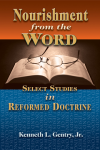
Nourishment from the Word
(by Ken Gentry)
Reformed studies covering baptism, creation, creeds, tongues, God’s law, apologetics, and Revelation
See more study materials at: www.KennethGentry.com
I will quickly survey the Scripture evidence for the Church’s being the continuation — or better, the fruition — of Israel.
Christians individually considered and the Church as a collective body are called by distinctively Jewish names: “For he is not a Jew, which is one outwardly; neither is that circumcision, which is outward in the flesh: But he is a Jew, which is one inwardly; and circumcision is that of the heart, in the spirit, and not in the letter; whose praise is not of men, but of God” (Rom. 2:28-29). Hence, it may be dogmatically and, dare we say, eternally proclaimed: “God is no respecter of persons” (Acts 10:34; Rom. 2:11; Gal. 2:6; Eph. 6:9; Col. 3:11; 3:25; 1 Pet. 1:17).
Christians are called “the circumcision”: “For we are the circumcision, which worship God in the spirit, and rejoice in Christ Jesus, and have no confidence in the flesh” (Phil. 3:3).
We are called “the children” and “the seed of Abraham”: “Know ye therefore that they which are of faith, the same are the children of Abraham…. And if ye be Christ’s, then are ye Abraham’s seed, and heirs according to the promise” (Gal. 3:7, 29).
We are of the “Jerusalem which is above” and are called the “children of the promise” (Gal. 4:24-29). In fact, Christians compose “the Israel of God” for we are a “new creature” regarding which “circumcision availeth nothing” (Gal. 6:16).
James designates Christians as “the twelve tribes which are scattered abroad” (Jms. 1:1). Peter calls the Christians to whom he writes, the “diaspora” (Gk., 1 Pet. 1:1). Paul constantly calls the Church the “Temple of God” which is being built in history as men are converted (1 Cor. 3:16-17; 1 Cor. 6:19; 2 Cor. 6:16; Eph. 2:21).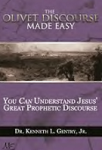
Olivet Discourse Made Easy (by Ken Gentry)
Verse-by-verse analysis of Christ’s teaching on Jerusalem’s destruction in Matt 24. Show the great tribulation is past, having occurred in AD 70.
See more study materials at: www.KennethGentry.com
Peter follows after Paul’s thinking, when he designates Christians as “stones” being built into a “spiritual house” (1 Pet. 2:5-9). But he does more; he draws upon several Old Testament designations of Israel and applies them to the Church: “a chosen generation, a royal priesthood, an holy nation.” (1 Pet. 2:9-10; Exo. 19:5-6; Deut. 7:6). He, with Paul, also calls Christians “a peculiar people” (1 Pet. 2:10; Tit. 2:14), which is a common Old Testament designation for Israel (Deut. 14:2; 26:18; Psa. 135:4).
Clearly, the biblical record presents Christianity as the fruition of Israel, never to be undone.









September 18, 2015
DISPENSATIONALISM’S EXALTATION OF RACE
 PMT 2015-112 by Kenneth L. Gentry, Jr.
PMT 2015-112 by Kenneth L. Gentry, Jr.
Dispensationalism is the bull in the china shop of biblical eschatology. The door needs to be opened and the bull released from the minds of earnest Christians. This will require an expose into the non-biblical nature of dispensationalism. I am continuing a series on the distortions of theology in the system.
A distinctive feature of dispensationalism is that the Millennial kingdom will be fundamentally Jewish in character, even to the point of rebuilding the temple, setting up David’s tabernacle, re-instituting the Jewish sacrificial system, and exalting the Jews: “This is the point: once Israel is restored to the place of blessing and the tabernacle of David is rebuilt, then will follow the third phase in the plan of God. That period will be the time of the millennium, when the nations will indeed by converted and ruled over by Christ” (House and Ice, Dominion Theology, 169; cp. Pentecost, Things to Come, ch. 30).
Dispensationalism surprisingly teaches such things as:
“The redeemed living nation of Israel, regenerated and regathered to the land will be head over all the nations of the earth…. So he exalts them above the Gentile nations…. On the lowest level there are the saved, living, Gentile nations” (Hoyt in Clouse, The Meaning of the Millennium, 81).
Greatness of the Great Commission (by Ken Gentry)
An insightful analysis of the full implications of the great commission. Impacts postmillennialism as well as the whole Christian worldview.
See more study materials at: www.KennethGentry.com
“The Gentiles will be Israel’s servants during that age…. The Gentiles that are in the millennium will have experienced conversion prior to admission.” (Pentecost, Things to Come, 508)
“Israel will be a glorious nation, protected from her enemies, exalted above the Gentiles….” (Walvoord, The Millennial Kingdom, 136)
House and Ice concur: “God will keep his original promises to the fathers and will one day convert and place Israel as the head of the nations” (House and Ice, Dominion Theology, 175).
To hold the historic Christian view of the Church as a new Israel forever, over against dispensationalism is not in any way suggestive of a Reconstructionist “charismatic connection” with the cultic Manifest Sons of God, as they suggest (Dominion Theology, App. A). As we sing in that great Christian hymn, “All Hail the Power of Jesus’ Name!”: “Ye chosen seed of Israel’s race/ Ye ransomed from the Fall.”
The Setting Aside of National Israel
While on earth Christ clearly and forthrightly taught that God would set aside national Israel as a distinctive, favored people in the kingdom: In Matthew 8:11,12 in the context of the Gentile centurion’s faith, He expressly says that the “sons of the kingdom shall be cast out” while “many from the east and west” shall enjoy the Abrahamic blessings. In Matthew 21:43 He parabolically teaches the rejection of national Israel when He says: “Therefore I say to you, the kingdom of God will be taken away from you, and be given to a nation producing the fruit of it.” In Matthew 23-24 He prophesies the removal of the spiritual center, the temple. He says it will be left “desolate” (Matt. 23:38) during the Great Tribulation (Matt. 24:21) when men should flee Judea (Matt. 24:16). He emphatically noted that “all these things shall come upon this generation” (Matt. 23:36; 24:34).
It is true that racial Jews in great mass will be saved later in the development of the kingdom in history (Rom. 11:11-25), per postmillennialism. The rub comes with their being exalted over and distinguished from saved Gentiles, and the turning back of the redemptive progress to “the weak and beggarly elements” of the sacrificial system.
As mentioned above, Isaiah 19:19-25 expressly alludes to Israel’s eventual equality in the kingdom: In verse 23 Isaiah says: “In that day Israel will be the third party with Egypt and Assyria, a blessing in the midst of the earth” (v. 23). Here the former enemies are seen receiving an equal share of God’s favor. In Zechariah 9:7 God speaks of His future favor upon other enemies of Israel. He refers to Ekron, one of the five chief cities of Philistia: “I will remove their blood from their mouth, and their detestable things from between their teeth. Then they also will be a remnant for our God, and be like a clan in Judah, and Ekron like a Jebusite.” This Philistine enemy is to become like “a clan in Judah.”
(by Ken Gentry)
A critique of easy believism and affirmation of Lordship salvation. Shows the necessity of true, repentant faith to salvation.
See more study materials at: www.KennethGentry.com
In a surprising query, House and Ice (174) favorably cite Hunt: “At what point did her sins become so bad that God had to go back upon His Word, nullify His promises, and reject Israel?” The point they are looking for is without question the crucifying of the Messiah, the greatest sin of all history! Jesus makes this the point of the parable mentioned above (Matt. 21:23ff). The constant apostolic indictment against the Jews was this gross, conclusive act of rebellion. Although it is true that the Romans were responsible for physically nailing Christ to the cross (John 18:30-31), nevertheless, when covenantally considered the onus of the divine curse falls squarely upon those who instigated and demanded it: the Jews. The Biblical record is quite clear and emphatic: the Jews are the ones who sought His death (Matt. 26; 27; John 11:53; 18; 19). This most heinous sin of all time committed by the Jewish nation is a constant refrain in the New Testament (Acts 2:22-23, 36; 3:13-15a; 5:30; 7:52; 1 Thess. 2:14-15).
The dispensational disavowal of covenantal ethical cause-and-effect blinds them to the reality of God’s rejection of national Israel. The very fact that it could be assumed that Israel’s rejection as a nation is a ‘going back on His word’ and a ‘nullifying of His promises’ is evidence of this. Deuteronomy 28:15ff is the classic statement of the reality of covenantal curse, but it is constantly brought before Israel (Deut. 6:14-16; 11:26-28; 30:15; Lev. 26:14-33). God’s curse upon Israel, rather than representing a going back on His promise, was a fulfilling of His own publicly stated (Deut. 4:26; 31:19, 21, 26), Israel-affirmed (Exo. 19:8; 24:3, 7) covenantal threat.









September 16, 2015
DISPENSATIONALISM AND THE SPIRITUAL KINGDOM
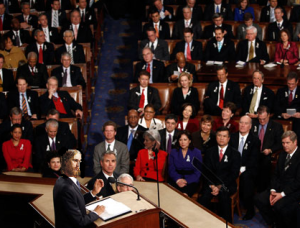 PMT 2015-111 by Kenneth L. Gentry, Jr.
PMT 2015-111 by Kenneth L. Gentry, Jr.
Classic dispensationalism I the most popular version of this eschatological perspective, the view held by most self-proclaimed “prophecy experts,” televangelists, and your neighbors. Therefore, it is important to analyze it as the leading competitor to postmillennialism. As I continue my critique of it I will return to elaborate on the spiritual nature of the kingdom which I briefly touched on in my last article.
Dispensationalists argue for the necessity of Christ’s physical presence if His kingdom is to come. For instance, House and Ice write in their critique of postmillennialism:
“Within the Reconstructionist framework, Messiah is in heaven and only present mystically in his kingdom. His absence from the earth during his kingdom reign robs Messiah of his moment of earthly glory and exaltation. It is a truncated reduction of the true reign of Christ. Since the first phase of Christ’s career, his humiliation, was spent physically upon the earth, it follows that there should be a corresponding display of his great glory through his reign on the earth” (House Divided, 240).
Though not intended as such, this statement is really quite demeaning to Christ for several reasons.
Great Tribulation: Past or Future?
(Thomas Ice v. Ken Gentry)
Debate book on the nature and timing of the great tribulation. Both sides thoroughly cover the evidence they deem necessary, then interact with each other.
See more study materials at: www.KennethGentry.com
First, it diminishes the absolute glory and majesty that is His as He is now enthroned at the right hand of God’s throne on high. The New Testament Church looks to its heavenly king as one enthroned in awe-inspiring majesty, far above all rule and authority and power (Matt. 28:18; Acts 2:30-36; Rom. 8:34; 1 Cor. 15:23, 24; Eph. 1:20; Col. 3:1; Heb. 1:3,13; 10:13 Heb. 12:2; 1 Pet. 3:22). Shall we say that His rule from heaven is a robbery of the glory due His Name? Is it the case that His present session in heaven is “a truncated reduction” of His reign?
Second, it speaks rather condescendingly of Christ’s rule. It offers to Christ but a “moment of glory” and speaks of His wondrous mystical presence as if meager: He “is only present mystically.” But His kingdom is an eternal kingdom, not a momentary one (Isa. 9:6; Luke 1:33; 2 Pet. 1:11; Rev. 11:15; 22:5). The indwelling presence of Christ is one of the rich blessings that flow forth from His glorious exaltation (John 7:39; Rom. 8:9; 1 Cor. 3:16; 6:19; 2 Cor. 6:16; Gal. 4:6; 1 John 3:24; 4:4). Shall we say He “is only present mystically”?
Third, this statement forgets that a major aspect of His humiliation was the fact that He came to earth (Rom. 8:3; Heb. 2:14; 10:5., hence it overlooks the fundamental consequence of His exaltation: His return to heaven to take up His manifest glory. In His High Priestly prayer we read:
I have glorified thee on the earth: I have finished the work which thou gavest me to do. And now, O Father, glorify thou me with thine own self with the glory which I had with thee before the world was…. As thou hast sent me into the world, even so have I also sent them into the world…. Father, I will that they also, whom thou hast given me, be with me where I am; that they may behold my glory, which thou hast given me: for thou lovedst me before the foundation of the world (John 17:4, 5, 18, 24).
God’s Law Made Easy (by Ken Gentry)
Summary for the case for the continuing relevance of God’s Law.
See more study materials at: www.KennethGentry.com
Why should it be necessary that Christ’s kingdom require His physical presence on earth? Does not Satan have a kingdom on earth, though he is only spiritually present (Matt. 12:26; Luke 4:6)?
Fourth, what kind of glory is it that teaches that Christ personally and corporeally rules on earth over a political kingdom that revolts against Him at the end (Rev. 20:7-9) (Pentecost, Things to Come, pp. 547-551). This involves a second humiliation of Christ, which I will deal with in a following article.









September 14, 2015
DISPENSATIONALISM AND CHRIST THE POLITICIAN
PMT 2015-110 by Kenneth L. Gentry, Jr.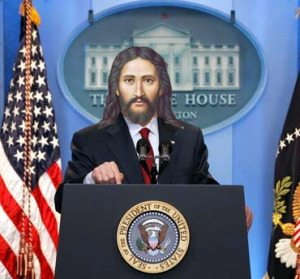
In my previous article I began a brief study considering some of the leading errors in classic (populist) dispensationalism. I opened with a presentation of the Christological distortions inherent in the system — which is significant in that Christ lies at the very center of Christianity. I will continue my concern with those Christological distortions in this article.
One of the difficulties dispensationalists have in understanding the Messianic kingdom promised by the prophets is with regard to its fundamental nature. Several major misconceptions lead them astray in this regard. We highlight but three: they assert of the Messianic kingdom that it will (1) be a future, earthly, Armageddon-introduced, political system, (2) require the physical presence of Christ on earth, and (3) be fundamentally Jewish in purpose and character.
For instance, House and Ice (Dominion Theology, 10) write “that Christ will soon rapture his Bride, the church, and that we will return with him in victory to rule and exercise dominion with him for a thousand years upon the earth.” Emphatically this kingdom will not be “until Christ rules physically from Jerusalem” (160). A proper understanding of the Messianic kingdom requires “a consistent distinction between the Bible’s use of Israel and the church” that leads “dispensationalism to distinguish God’s program for Israel from his program for the church” [p. 419] hence the Jewishness of the Messianic kingdom.
The Spiritual Kingdom
Despite House and Ice’s confusion, the Scripture is quite clear regarding the spiritual nature of the kingdom. It is a distinctive of dispensationalism that asserts Christ offered to Israel a literal, political, earthly kingdom, but that the Jews rejected it, thus causing its postponement (Dominion Theology, 173; 279; Pentecost, Things to Come, 456–66). This view of the kingdom is totally erroneous. As a matter of fact, it was just that sort of kingdom that the first century Jews wanted and that Christ refused: “When Jesus therefore perceived that they would come and take him by force, to make him a king, he departed again into a mountain himself alone” (John 6:15).
Four Views on the Book of Revelation
(ed. by Marvin Pate)
Helpful presentation of four approaches to Revelation. Ken Gentry writes the chapter on the preterist approach to Revelation.
See more study materials at: www.KennethGentry.com
The disciples themselves missed His point for the most part, while He was on earth. This is evidenced in the Emaus Road encounter after the crucifixion, where these disciples lament: “But we trusted that it had been he which should have redeemed Israel: and beside all this, to day is the third day since these things were done” (Luke 24:21). We should note that Jesus rebuked them for such foolishness: “Then he said unto them, O fools, and slow of heart to believe all that the prophets have spoken: Ought not Christ to have suffered these things, and to enter into his glory? And beginning at Moses and all the prophets, he expounded unto them in all the scriptures the things concerning himself” (Luke 24:25-27). They expected political deliverance and glory to come to Israel through this Messiah. But Jesus spoke to them of the true meaning of the prophecies of the Old Testament, showing them that He must suffer and then enter His resurrected, heavenly glory.
In response to the Pharisees, Christ specifically declared that the kingdom does not come visibly and gloriously (as the dispensational construction would have it!): “And when he was demanded of the Pharisees, when the kingdom of God should come, he answered them and said, The kingdom of God cometh not with observation: Neither shall they say, Lo here! or, lo there! for, behold, the kingdom of God is within you” (Luke 17:20-21). Obviously a spiritual conception of the kingdom is here demanded, in contradiction to an Armageddon-introduced, earthly, political kingdom.
The Redemptive Kingdom
This is why Christ went about preaching what is termed the “gospel of the kingdom” (Matt. 4:23; 9:35; 24:14; Mark 1:14-15). He proclaimed a redemptive, spiritual kingdom. Hence His being exalted to His throne, leads to a spiritual effusion of grace, not the political establishment of an earthly government (Luke 24:44-49; Acts 2:30-35; 3:22-26; 8:12; Eph. 4:8-11).
A major accusation against Jesus was that He promoted a political kingdom in competition with Caesar’s empire. This explains why Jesus was concerned to discover the source of the accusation — He knew of the misconception of the Jews in this regard. His answer indicates that His is a spiritual kingdom:
Then Pilate entered into the judgment hall again, and called Jesus, and said unto him, Art thou the King of the Jews? Jesus answered him, Sayest thou this thing of thyself, or did others tell it thee of me? Pilate answered, Am I a Jew? Thine own nation and the chief priests have delivered thee unto me: what hast thou done? Jesus answered, My kingdom is not of this world: if my kingdom were of this world, then would my servants fight, that I should not be delivered to the Jews: but now is my kingdom not from hence. Pilate therefore said unto him, Art thou a king then? Jesus answered, Thou sayest that I am a king. To this end was I born, and for this cause came I into the world, that I should bear witness unto the truth. Every one that is of the truth heareth my voice. (John 18:33-37)
Had He not presented His kingship in terms of meekness and lowliness and not of a conquering, political entity? “All this was done, that it might be fulfilled which was spoken by the prophet, saying, Tell ye the daughter of Sion, Behold, thy King cometh unto thee, meek, and sitting upon an ass, and a colt the foal of an ass” (Matt. 21:4,5). In illustration of the Emaus Road confusion, John adds regarding this triumphal entry in fulfillment of prophecy that “these things understood not his disciples at the first: but when Jesus was glorified, then remembered they that these things were written of him, and that they had done these things unto him” (John 12:15-16).
The Glory of Christ (book by R. C. Sproul)
From the angels’ revelation of Jesus’ glory to the shepherds outside Bethlehem, to Jesus’ life-changing revelation of His glory to Paul on the Damascus road, Sproul guides us to a deeper understanding of Christ’s glory.
For more study materials: www.KennethGentry.com
Paul picks up on and promotes the spiritual nature of the kingdom, when he writes that “the kingdom of God is not meat and drink; but righteousness, and peace, and joy in the Holy Ghost” (Rom. 14:17). He disavows any carnal conception of the kingdom. Likewise does he speak of attaining an inheritance in the spiritual kingdom (the heavenly aspect of the kingdom) for those who are righteous (1 Cor. 6:9-10; 15:50; Gal. 5:21). He even says very plainly of the heavenly aspect of the kingdom: “Now this I say, brethren, that flesh and blood cannot inherit the kingdom of God; neither doth corruption inherit incorruption” (1 Cor. 15:50). How could it be that an earthly, political kingdom would hold forth no inheritance for flesh and blood people? It is in salvation that we are “delivered from the power of darkness, and translated into the kingdom of his dear Son: In whom we have redemption through his blood, even the forgiveness of sins” (Col. 1:12,13).








Kenneth L. Gentry Jr.'s Blog
- Kenneth L. Gentry Jr.'s profile
- 85 followers




